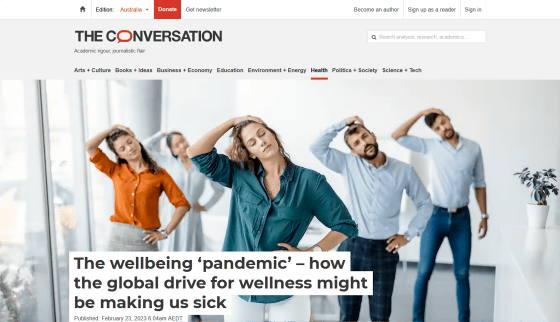What is the adverse effect of the 'well-being pandemic' that excessively pursues happiness?

'
The wellbeing 'pandemic' – how the global drive for wellness might be making us sick
https://theconversation.com/the-wellbeing-pandemic-how-the-global-drive-for-wellness-might-be-making-us-sick-198662

Well-being is one of the priorities of modern society, intermingled with diverse concepts such as happiness, quality of life, life satisfaction, mindfulness and health. Jackson et al. point out that well-being has uncritically positive meanings like concepts such as ``democracy'' and ``freedom,'' and that disputing well-being is seen as a problem. doing.
Well-being in recent years has two main concepts, one of which is 'subjective well-being', which indicates an individual's mental and physical health. In 1998, the World Health Organization (WHO) established The WHO-5 Well-Being Index, which measures an individual's mental state according to five factors: cheerfulness, calmness, vitality, peace of mind, and fulfillment. table) , and now governments and companies around the world are deciding policies based on this WHO-5 mental health status table.
But Jackson et al. argue that the WHO-5 mental health status table oversimplifies subjective well-being and undermines different cultural perspectives on mental health, calling into question its validity. It points out that

A second well-being concept, objective well-being, focuses on preventing growing social inequalities. For example, in New Zealand, social prosperity is measured using a scale called '
In response, Jackson et al. argued, 'Such efforts are rooted in a particular neoliberal paradigm of the idea that individual behavior, rather than the broader political and economic structures that surround us, are the determinants of change.' The problem is that it is rooted.'

Efforts by organizations to improve employee well-being by bringing up principles such as the WHO-5 Mental Health Status Chart and the Standards of Living Framework run the risk of more or less leading to surveillance and regulation of personal activities. I'm full. ``Whether intentionally or not, many organizations interpret and use wellbeing principles and policies to reinforce existing structures and hierarchies,'' Jackson et al.
For example, the emergence of departments, committees, new policies, programs and workshops organized to improve well-being puts a kind of pressure on the members of the organization. Since non-participation in these initiatives can lead to stigma such as ``uncooperative'' or ``uncooperative,'' even those who are really reluctant should consider participating in these initiatives as a semi-obligatory task. I have no choice but to participate in This can result in people's stress, which may have an adverse effect on their mind and body.
Jackson et al. Call it 'well-being washing' and criticize the scheme that actually puts a burden on employees, although it appeals that it is working to improve well-being externally.
Jackson et al. argue that ``Well-being is now no longer a neutral domain, but a ``field of power,'' a place where parties promote their own interests at the expense of others. It is imperative that academics, policy makers and citizens explore who and what values they represent, where they are responsible for governing and who they influence. ' and argued that critical consideration would be a vaccine against the 'well-being pandemic.'

Related Posts:
in Note, Posted by log1h_ik







